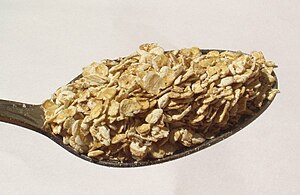Cookbook:Rolled Oats
| A Wikibookian suggests that this book or chapter be merged into Cookbook:Oats. Please discuss whether or not this merge should happen on the discussion page. |
Cookbook | Recipes | Ingredients | Equipment | Techniques | Cookbook Disambiguation Pages | Ingredients

Rolled oats are traditionally oat groats that have been rolled into flat flakes under heavy rollers and then steamed and lightly toasted. The oat, like the other cereals, has a hard, inedible outer husk that must be removed before the grain can be eaten. After the outer husk (or chaff) has been removed from the still bran-covered oat grains, the remainder is called oat groats. Oat groats are a whole grain that can be used as a breakfast cereal. Steel-cut oats are oat groats that have been chopped into smaller pieces and retain bits of the bran layer.
Since the bran layer, though nutritious, makes the grains tough to chew and contains an enzyme that can cause the oats to go rancid, raw oat groats are often further steam-treated to soften them for a quicker cooking time (modern "quick oats") and to denature the enzymes for a longer shelf life.
Rolled oats that are sold as oatmeal usually, but not always, have had the tough bran removed. They have often, but not always, been lightly baked or pressure-cooked or "processed" in some fashion. Thick-rolled oats are large whole flakes, and thin-rolled oats are smaller, fragmented flakes.
Oat flakes that are simply rolled whole oats without further processing can be cooked and eaten as "old-fashioned" oatmeal, but more highly fragmented and processed rolled oats absorb water much more easily and therefore cook faster, so they are sometimes called "quick" or "instant" oatmeal.
Oatmeal can be further processed into coarse powder, which, when cooked, becomes a thick broth. Finer oatmeal powder is often used as baby food. Rolled oats are also often the main ingredient in Granola and muesli.
Whole oats are an excellent source of thiamine, iron, and dietary fiber. Fiber is helpful in reducing cholesterol levels in the bloodstream. Whole oats are also the only source of antioxidant compounds known as avenanthramides; these are believed to have properties which help to protect the circulatory system from arteriosclerosis.